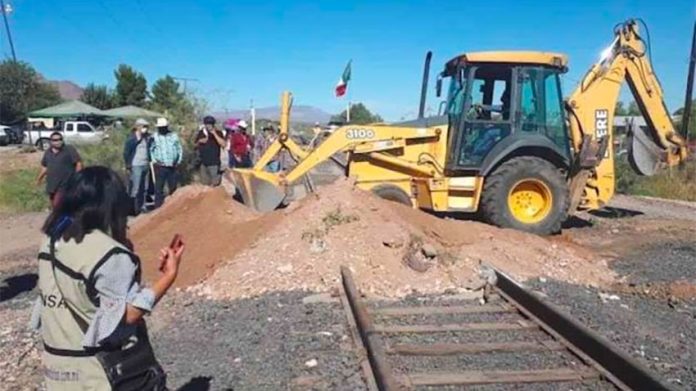Farmers in Chihuahua opposed to the diversion of water to the United States lifted their almost two-month-long rail blockade on Sunday after the state government agreed to support their demands.
Piles of earth and gravel that were dumped on tracks in eight locations in the municipality of Meoqui on August 26 were removed after state officials met with the disgruntled farmers and pledged to support nine demands set out in a document submitted to the federal government’s Chihuahua delegate.
One key demand is that the Chihuahua government lobby the federal government to release three farmers who were arrested in Delicias on September 8, the day farmer Yéssica Silva was fatally shot and her husband was wounded during an alleged attack on their vehicle by the National Guard after a protest at the La Boquilla dam.
Among the other nine demands are that no more water be diverted to the United States from dams in the Conchos River basin, that the National Guard and army withdraw from dams and deploy instead to insecurity hotspots such as Ciudad Juárez and the Sierra region and that criminal complaints against farmers for damage caused during protests be dropped.
The document also calls for justice for Silva and her husband. The farmers’ decision to lift their blockade was welcomed by the state government.
“By lifting the blockade of the rail tracks in Estación Consuelo, Meoqui, the economic vibrancy linked to the transport of rail freight in this region will return,” it said in a statement.
“The Chihuahua government is delighted with the decision that puts an end to the impact on this economic sector and reiterates its commitment to accompany the state’s farmers in their fight for water.”
The Confederation of Industrial Chambers said earlier this month that the rail blockade was generating losses of 450 million pesos (US $21.4 million) per day. Therefore, total losses during the almost two-month-long blockade likely totaled about 27 billion pesos (US $1.3 billion).
The Chihuahua government said that the incomes of thousands of families in the northern state were affected by the blockade and that its removal will benefit farmers, industry and the railroad industry.
The decision to lift the blockade came three days after the federal government announced that it had reached an agreement with the United States to settle Mexico’s water debt to its northern neighbor. Mexico and the United States have to send water to each other under the terms of a 1944 bilateral treaty.
The federal government’s efforts to divert water to the U.S. from Chihuahua, where many municipalities are in a state of drought, have triggered countless protests by farmers who argue that they will be left without the essential resource.
Source: Reforma (sp)
